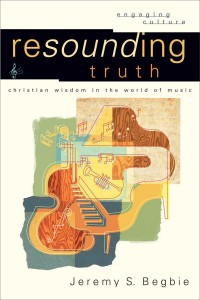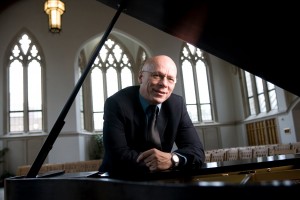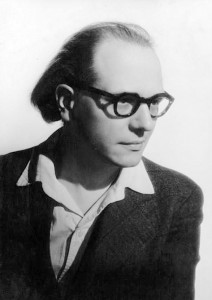Resounding Visions
I have just finished Jeremy Begbie’s latest book-length treatment of the music-theology relationship, Resounding Truth: Christian Wisdom in the World of Music (Baker Academic: Grand Rapids, 2007), a penetrating but accessible exploration of a wide range of musical and spiritual issues destined for a educated but non-specialist readership which has merited strong endorsements from the likes of contemporary heavyweights such as Rowan Williams and NT Wright. As some of you will probably already know, Jeremy Begbie, currently Thomas Langford Research Professor of Theology at Duke University, is without doubt one of the foremost figures in the interdisciplinary conversation between Christian faith and the arts, a compelling writer and dynamic speaker who brings his understanding of music as a trained practitioner to bear on his theology in highly creative ways.
After an opening section outlining a basic approach to looking at music as ‘art in action’ (drawing on the work of Nicholas Wolterstorff) and dealing with music in Biblical times, Resounding Truth embarks on a concise but far from superficial history of the sometimes stormy relationship between music and theology. The journey from Pythagoras and Christian neo-Platonism through the Reformation, Bach and Schleiermacher through to Barth, Bonhoeffer, Olivier Messiaen and James MacMillan is skilfully set against a broader backdrop of the search for resolutions to ancient tensions in conceptualizing the relation between God and World, matter and spirit, the visible and the invisible, nature and culture, music and text, an objectively existing world and human subjectivity. Part Three, perhaps the most original and thought-provoking section of Resounding Truth, argues persuasively that music has a positive rôle to play in a present-day context as a component of a responsible ‘Christian Ecology’ that would avoid the false dichotomies of the past with regard to human beings’ relationship to the physical world, offering neither escape from temporal embodiment into a realm of timeless spirituality, nor the idolization of the material as such.
To affirm music’s place as belonging to a broader ‘ecology’ rooted in an ultimate and loving purpose to the world’s existence requires that music has to be acknowledged as more than simply a social construct. This, Jeremy Begbie contends, is
‘arguably the important question facing the theology-music conversation in the present climate: Is music in any way grounded in or obliged to be faithful to a world that we did not make but that is in some sense given to us? Are music making and music hearing to be understood as embedded in and responsible to an order wider than that which we generate – one that is worthy of respect and trust?’[1]
One reason that this question is so significant is that we are living at a time when, because of the ambivalent trajectory of modern Western thought over several centuries, many are no longer convinced of ‘the extent to which our world is to be considered anything more than is simply there in a bare, neutral sense.’ Although not mentioned by name, it is clear that contemporary debates between reductionist materialism and a theistic world-view are in the background here: ‘Even if not raised with theological concerns in mind, this issue inevitably presses us strongly in a theological direction – if the world is given, then by what or whom, and to what end?’[2]
 A core assertion in Resounding Truth is that we need to recover a sense that the universe has meaning as a created cosmos which, as modern scientific research into natural processes is increasingly showing, is an interplay of order and freedom (theologically this can in Trinitarian terms be mapped on to God’s creative activity through the Son and Spirit respectively – a line which regular readers of this blog may well recognize):
A core assertion in Resounding Truth is that we need to recover a sense that the universe has meaning as a created cosmos which, as modern scientific research into natural processes is increasingly showing, is an interplay of order and freedom (theologically this can in Trinitarian terms be mapped on to God’s creative activity through the Son and Spirit respectively – a line which regular readers of this blog may well recognize):
‘A stress on both Christ’s and the Spirit’s work in creation can help us here. In the New Testament, Christ is associated especially with the ordering and coherence of the world […] [b]ut along with this, do we not also need a strong sense of the activity of the Spirit, whose particular ministry is to realize now in ever fresh and unpredictable ways what has already been achieved in the Son? To put it another way, the Spirit is the improviser.’[3]
Given such a framework of creation, the structure which we discern in music is therefore not merely a projection of our own making, but is a question of the ‘grain of the universe’. Music is certainly a human activity, and many of its ‘meanings’ are undoubtedly the products of cultural encoding, but it relies at a deeper level – as Pythagoras was the first to discover – on the inherent properties of sound, without which no music would be possible. Until the late Middle Ages the link between these properties and the proportions of a ‘harmonious’ universe was assumed as the basis for theorizing about music; Resounding Truth’s contention is that the history of music in the West from the Renaissance onwards can in some respects be viewed in terms as a mirror of the gradual collapse of the belief in an objectively ordered cosmos and its replacement by a concentration on the human subject as the generator of meaning. This trend in Western art-music reaches its ultimate point in the absolute determination of the music material in ‘integral serialism’ of the avant-garde in the 1950s (the subjection of all parameters of musical composition to mathematical control). The paradoxical outcome, however, is not the apotheosis of human freedom but – as Adorno saw half a century ago – the resistance of the material, with an artistic result which is aurally indistinguishable from its theoretical opposite, randomly generated chaos. This Begbie sees as a form of ‘control at the price of destruction’, emblematic of the modern ecological crisis, which he describes in terms reminiscent of Jacques Ellul: ‘through ever stricter control we lose control of our God-given home and become increasingly alienated from it.’[4]
__________________
At the heart of post-Enlightenment modernity, it has been argued not only by Begbie but also a variety of other thinkers such as John Milbank, Charles Taylor or most recently Oxford University’s Professor of Religion and Science Peter Harrison[5], is a dualistic view of the universe as divided into an inert, demystified and ultimately meaningless material realm on one hand which is dominated ruthlessly by a seemingly all-powerful technology on the other. Developing Resounding Truth’s line of interpretation, it might be said that this outlook – which has also had a major impact on religious thought, not least through a disastrous reading of Genesis 1:26-28 in terms of domination rather than stewardship – expresses itself in (at least) three different but equally problematic ways.
A first consequence, as has just been noted, has been the steadily increasing alienation of human beings from nature, resulting in the over-exploitation of the earth’s resources, the generation of Adorno’s soulless ‘administered world’ and the ecological devastation we see all around us. That this has to a large extent become the default position of Western civilization in late modernity is something which, thankfully but belatedly, increasing numbers of people are now realizing.
The second consequence of the disenchantment of the natural realm is in some respects the opposite of modernity’s hubristic elevation of humanity to God-like status, although it follows logically from it. Once non-human nature has been stripped of any metaphysical significance (no longer ‘charged with the grandeur of God’, to quote Gerard Manley Hopkins’ famous formulation), then reductionist scientific materialism’s deconstruction of the supposed qualitative difference between humanity and nature effectively reduces human beings to nothing but ‘machines controlled by our genes’ (Richard Dawkins). According to this nihilistic scheme, the ‘ancient covenant’ of meaning is ‘in pieces’, to cite Jacques Monod’s memorable conclusion in Chance and Necessity; humanity is as much an instantiation of an underlying futility as volcanic ash or pond scum.
The third possibility arises out of a reaction to the first two: in an attempt to re-invest the universe with meaning while (understandably) accepting the continuum between human beings and the natural world, this view takes the ‘pantheist’ option of deifying nature, an option followed by much New Age spirituality. This at least restores some semblence of sense to the sphere of the material, but at the price of leaving no room either for a transcendent deity or for human culture as being somehow more than nature. Once an impersonal vitalism is embraced as a governing interpretive framework for viewing the world, it is human history and civilization which risks being deprived of any significance.
The philosophical interest of a figure such as Olivier Messiaen (whether or not one likes his music) is that he seems to believe that there is an alternative to all three of these scenarios, and that this alternative consists in some way of a return to a ‘sacramental’ universe in which things point beyond themselves not to a Kantian sublime of abstract concepts which relegates the realm of the senses to insignificance, but to a transcendent, loving source of all beauty, goodness and truth which imbues the material world with meaning. However, if there is an element of nostalgia for a pre-modern world-view here, Messiaen’s approach is not regressive (his belief that all times are simultaneous for God relativizes human categories of historical progress or regress). For all his frequent appeals to Thomas Aquinas in works such as Les Corps Glorieux, Messiaen is not embracing a reactionary, obscurantist agenda (his Aquinas is far closer to the holistic blend of theology and devotional spirituality promoted by the nouvelle théologie than to a dry scholasticism). Messiaen’s fantastic cosmos is certainly ‘re-enchanted’, but not by a denial of modern scientific discovery; like many thinkers at the frontier between science and faith from Teilhard de Chardin to Alister McGrath or Holmes Rolston III, he instead finds an element of wonder and mystery in modern science itself that he intriguingly reconciles with the pre-modern, with a profound meditation on the nature of number providing the most obvious common element shared between the two historically distant epochs. The musical universe that results is ‘half-medieval, half ultra-modern’, to use his description of one of his heroes and main influences, the composer and organist Charles Tournemire (1870-1939). Messiaen is every bit as much at home with Einsteinian relativity as with Gregorian chant, as a glance at the bewilderingly wide array of topics in his multi-volume compositional treatise reveals.
Where Messiaen’s work is fascinatingly actual is in the clue that it perhaps provides to a possible way out of some contemporary quandaries as to how our world might be ‘re-enchanted’ without relapse into superstition. Messiaen is not a fundamentalist in the sense of asserting that the modern scientific enterprise is to be dismissed en bloc as a snare and delusion. But neither does he suggest that the Biblical narrative needs a thorough-going demythologization in the light of science, of the type famously proposed by Rudolf Bultmann, whose famous essay on de-mythologizing the New Testament appeared in 1941, the same year as Messiaen’s Quatuor pour la fin du temps. In that work, as in Visions de l’Amen, Messiaen appeals to a robustly orthodox over-arching framework of Creation (of an evolutionary sort, it should be said, a gradual emergence from an initial nebulous potentiality as depicted in the first ‘Vision’), Redemption and ultimate Consummation. But at the same time Messiaen approaches composition not merely as a form of self-expression – although his music can at times be extremely lush and provocatively emotional – but also as a type of ‘scientific’ experimentation with new technical procedures, mathematical permutations and startlingly original combinations of apparently irreconcilable musical materials. As a composer, Messiaen is indisputably one of the great pioneers of the twentieth century. There may be some validity to the criticism of Jeremy Begbie and others that Messiaen’s thought is too uncritical of static categories of being that set an immutable Divine eternity in polar opposition to this-worldly temporality (it has to be said that the category of becoming is not a natural one for him), but on the other hand, Messiaen’s praxis as a teacher and participant in French cultural life over six decades demonstrates that he was anything but disengaged from historical processes and the life of the world around him.
As a thinker, Messiaen undoubtedly has his limits. His written commentaries on his own music are highly idiosyncratic and frequently, if not always fairly, laughed out of court for the naïveté of theirextravagant language. For all his considerable knowledge of Christian tradition, his Biblical exegesis and use of literary sources frequently border on the whimsical. And yet it would surely be unreasonable to require of Messiaen, as someone who cautiously called himself a ‘theological musician’, the type of intellectual rigour expected either of a professional philosopher or a systematic theologian. To see Messiaen as providing the conceptual resources for a refutation of atheistic post-modern thought, as has boldly been claimed by writers such as Milbank and Catherine Pickstock in their arguments with Gilles Deleuze,[6] is perhaps to stretch the point too far, despite their many intriguing insights. Argumentative coherence is not Messiaen’s primary aim – although there are definite elements both of dogmatic theology and philosophical speculation in his work which cannot be neglected for its proper appraisal, his greatness principally lies in the richness of his musical output.
Here it would seem important to bear in mind the extent to which Messiaen’s mindset was shaped by his day-to-day experience over 60 years as a church organist in the service of the Eucharist. Messiaen’s theorizing and composing are both ultimately best seen as acts of prayerful worship; viewed in this light his intellection is essentially a ‘liturgy of the mind’ as it meditates on Creation. His music may remain impossibly arcane for some, crassly sentimental for others, but perhaps Messiaen’s greatest achievement is his reconciliation of theology as rational reflection with an authentic spirituality expressed through music, the testimony of a life which is liturgical in the sense of being shot through by wonder, lived in a spirit of ‘supernatural childhood before God’ (Romano Guardini). And at its best, as in the wartime works such as the Quatuor pour la Fin du Temps, Visions de l’Amen and Trois Petites Liturgies de la Présence Divine as in his later masterpieces such as La Transfiguration, Messiaen’s music strikes a remarkable balance between the head, the heart and the gut, offering us an inspiring glimpse of the wholeness intended by God not only for human beings but for the entire cosmos.
[1] Jeremy Begbie, Resounding Truth : Christian Wisdom in the World of Music (Grand Rapids, MI : Baker Academic, 2007), 307.
[2] Ibid..
[3] Ibid., 200.
[4] Ibid., 247.
[5] In his 2011 Gifford Lectures delivered at Edinburgh University, which can be viewed on-line at http://www.youtube.com/playlist?list=PLEA9467E8E8D991AE . See especially Lecture 3, ‘The Disenchantment of the World’.
[6] See Catherine Pickstock, ‘God and Meaning in Music: Messiaen, Deleuze, and the Musico-Theological Critique of Modernism and Postmodernism’ in Sacred Music Vol. 134/4 (Winter 2007), 40-62.


